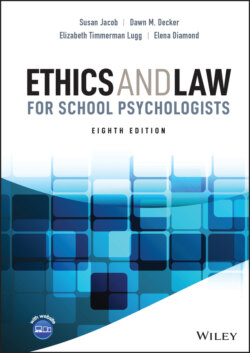Читать книгу Ethics and Law for School Psychologists - Susan Jacob - Страница 77
Freedom of Religion
ОглавлениеThe First Amendment also ensures the basic right to free exercise of religious choice, and, under the 14th Amendment, both Congress and the states are prohibited from passing laws “respecting an establishment of religion.” The First Amendment is the source of two types of church-school-state cases: those involving the use of public funds for parochial schools and those involving school policies or classroom procedures objected to on religious grounds. (For a discussion of cases involving school-sponsored prayer or other religious activities, see Russo, 2018.)
In general, court interpretations of the First Amendment suggest that the state is not allowed to provide funds directly to parochial schools. However, under the “child benefit theory,” the state may provide educational services (e.g., remedial instruction and school psychological services) for students attending parochial schools as long as those services directly aid the student, they are not used for the purpose of religious instruction, and there is no impermissible entanglement of church and state (Agostini v. Felton, 1997; Wolman v. Walter, 1977).
In 2002, the Supreme Court decided Zelman v. Simmons-Harris, a case concerning whether the First Amendment prohibition against Congress establishing a religion prevents a state from providing tuition monies to parents and allowing them to use that aid to enroll their children in a private school of their own choosing, without regard to whether the school is religiously affiliated. In a narrow 5–4 ruling, the Court held that such school voucher plans are constitutionally permissible, so long as the money that flows to the parochial schools results from the true choice of schools by parents.
In two recent cases, the current Court has shown even greater willingness to erase distinctions for available funding between public and religious schools. In the first case, Trinity Lutheran Church of Columbia, Inc. v. Comer (2017), the Court held that disqualifying otherwise eligible recipients from a public benefit “solely because of their religious character” imposes “a penalty on the free exercise of religion that triggers the most exacting scrutiny” (p. 2015). At issue was participation in a program for playground improvement under which religious schools had been specifically barred.
In Espinoza v Montana Department of Revenue (2020), the Montana Legislature sought “to provide parental and student choice in education” (p. 2251) by enacting a scholarship program for students attending private schools. The program granted a tax credit of up to $150 to any taxpayer who donated to a participating “student scholarship organization” which then used the donations to award scholarships to children for tuition at a private school; however, religious private schools were excluded. The Court held that excluding qualified religious schools from its school scholarship program was a violation of the Free Exercise Clause of the First Amendment and therefore unconstitutional. “A State need not subsidize private education. But once a State decides to do so, it cannot disqualify some private schools solely because they are religious” (p. 2261).
